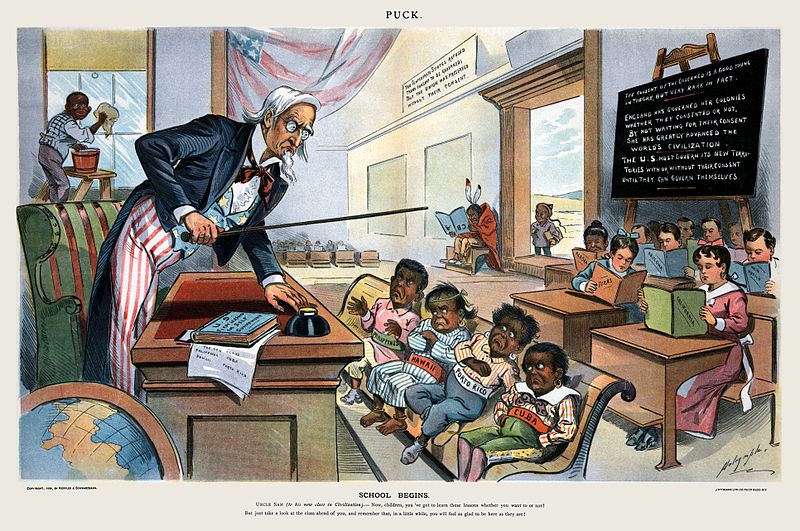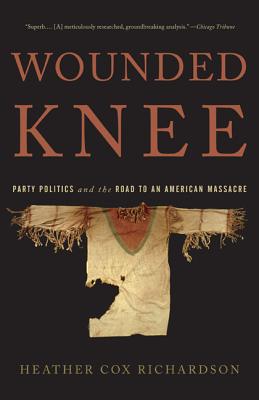American History Chat - April 23, 2020
Due to a technical issue the video for this session is broken up into two parts
Link to first part of video on Facebook
Link to second part
Link to transcript

The American paradox series continues with a further account of the late nineteenth century. In this period, Americans are concerned about 'communism' and see the myth of the American cowboy as a foil, with its image of the heroic white man bringing civilization to savages, and building communities in the wilderness. Heather discusses the forces that drove American politics in this era, in particular as political alliances in the North and the East solidified, the West became a fertile ground to grow voting coalitions. It became mutually beneficial for elites in established regions of the country to form alliances with their counterparts in the West, and the losers in this narrative were Mexican, Chinese, African and Native Americans.
Links (underlined) related to topics covered in the chat
How the 1876 Election Effectively Ended Reconstruction
Quote from site: The results of the U.S. presidential election of 1876 were a mess. A Democratic candidate had emerged with the lead in the popular vote, but 19 electoral votes from four states were in dispute. In 1877, Congress convened to settle the election—and their solution proved to be the beginning of the end for Reconstruction in the south.
23 maps that explain how Democrats went from the party of racism to the party of Obama
This article outlines (with maps) a 180 year history of the shift in politics of the Democratic politics.
When Adding New States Helped the Republicans
Quote for site: In 1889 and 1890, Congress added North Dakota, South Dakota, Montana, Washington, Idaho, and Wyoming—the largest admission of states since the original 13. This addition of 12 new senators and 18 new electors to the Electoral College was a deliberate strategy of late-19th-century Republicans to stay in power after their swing toward Big Business cost them a popular majority. The strategy paid dividends deep into the future
Politics of the 1870s and 1880s
Two seemingly incongruent trends marked the political landscape of the last quarter of the nineteenth century. At no other time was the citizen’s interest in elections and politics more avid than during this time period. In fact, 80 to 90 percent of the eligible voters (white and black males in the North and white males the South) consistently voted in local and national elections. This amazing turnout occurred at a time when the major political parties differed little on the issues and when the platforms of the two main national political parties were almost indistinguishable. Consequently, throughout the era, voters gave few strict mandates to either parties or individuals and the outcomes of the presidential races were determined by a relatively small number of votes.
Why Were Tariffs Politically Important in Late 19th-Century America?
This is Heather’s blog post from December 2013 on this topic.
“Our Misery and Despair”: Kearney Blasts Chinese Immigration
Quote from site: Anti-Asian agitation characterized politics in the American West, particularly labor politics, in the late-19th century. Labor leaders like Denis Kearney and H. L. Knight of California’s Workingmen’s Party often resorted to popular racist arguments to justify the exclusion of Chinese immigrants. In this 1878 address, Kearney and Knight described the Chinese as a race of “cheap working slaves” who undercut American living standards and thus should be banished from America’s shores. While rare, some in the labor movement challenged the racist appeals of leaders like Kearney and Knight.
James Blaine, Presidential Contender
Historians discussed the role of James Blaine (1830-1893) in changing politics. One of the most colorful, and divisive figures in post-Reconstruction U.S. politics, James Blaine was the 1884 Republican presidential nominee, and served as speaker of the House, a U.S. senator from Maine, and secretary of state under three presidents. He lost the 1884 election by 1,047 votes in New York State in what has been called “the dirtiest campaign in American history.”
Program from the meeting of the Trans-Mississippi Commercial Congress in Cripple Creek
Heather mentioned the Trans-Mississippi Congress in the chat today, but it is quite hard to find information about this on the internet. Here is an old site which has screenshots from an out-of-print book. See page 7 for a introduction to this.
Western frontier life in America
This site, probably made for a college class, covers many topics Heather also covered in her chat, pertaining to life on the frontier.
Labor wars in the US
This site lists labor wars from 1870's to the 1980's.
The Agrarian and Populist Movements
Quote from site: Decreases in crop prices and crop failures in the 1880s bred economic discontent among farmers that led to the formation of the Populists....The economic transformation taking place during the Gilded Age created prosperity and new lifestyles for some, but these changes also had a widespread negative impact in areas dominated by farming...During the late 1880s, a series of droughts devastated the West. To make matters worse, the McKinley Tariff of 1890 was one of the highest the country had ever seen. This was detrimental to American farmers, as it drove up the prices of farm equipment. By 1890, the level of agrarian distress was at an all-time high...The Populist Party emerged out of the Farmers’ Alliances and the agricultural distress of the 1880s.
Coeur d'Alene Miners' Dispute (1892-1899)
Quote from site: The strike of 1892 had its roots in the first pay cut by the Bunker Hill Mining Company in 1887. Immediately after the reduction in wages miners organized the first union at Wardner on November 3, 1887. The response to that violence, disastrous for the local miners' union, became the primary motivation for the formation of the Western Federation of Miners (WFM) the following year.
Johnson county war
Quote from site: On April 5, 1892, 52 armed men rode a private, secret train north from Cheyenne. Just outside Casper, Wyo., they switched to horseback and continued north toward Buffalo, Wyoming, the Johnson County seat. Their mission was to shoot or hang 70 men named on a list carried by Frank Canton, one of the leaders of this invading force. The invaders (as they came to be known) included some of the most powerful cattlemen in Wyoming, their top employees and 23 hired guns. The invasion resulted from long‑standing disputes between these cattle barons, who owned herds numbering in the thousands, and small operators, most running just enough cattle to support their families.
The Gospel of Wealth
Carnegie's document extolling the virtues of individualism
The Significance of the Frontier in American History
This is the 1893 address in which Turner develops the Frontier thesis.
The Significance of the Frontier in an Age of Transnational History
The concept of the frontier among scholars has changed considerably over the past 25 years. This symposium invited historians, literary scholars, and cultural critics to revisit the famed Frontier Thesis written by Frederick Jackson Turner more than 100 years ago. This link leads to a set of 5 podcasts comprising discussions at the Huntington library in 2012.
Roosevelt and the Image of Manliness
Quote from site: "At the turn of the 20th century, industrialism and immigration had upset the old social orders, and the dominance of Northern white Protestant males was being threatened by radical unions, strikes and class conflicts, urban slums and the rise of the independent “New Woman.”...So they looked to the West. In the 1880s, Buffalo Bill Cody brought his famous Wild West shows back East and the cult of the cowboy was born. For Roosevelt, the vigorous, unbridled life of the Western cowboy was the perfect antidote to the softness of comfortable city living that drained men of their “life juices.”
Why didn't the Phillipines become a state
A very good thread from Quora explaining this.
The Insular Cases: History and Significance
QUOTE from site: The Insular Cases refers to a series of Supreme Court decisions made beginning in 1901 concerning the constitutional rights afforded to residents of the overseas territories the U.S. had acquired in the Treaty of Paris: Puerto Rico, Guam, and the Philippines, as well as (eventually), the U.S. Virgin Islands, American Samoa, and the Northern Mariana Islands.
US territories: Introduction
"The debate arose from a unique historical moment. In 1898, the United States won the Spanish-American War and, by treaty, acquired the territories of Puerto Rico and the Philippines. Previous U.S. territorial acquisitions — for example, the Louisiana Purchase from France and the acquisition of Florida from Spain — obligated the federal government to admit these localities to the Union and extend constitutional rights to them. For example, the United States’ treaty for the purchase of the Louisiana territory provided the following: “The inhabitants of the ceded territory shall be incorporated into the Union of the United States, and admitted as soon as possible, according to the principles of the Federal Constitution, to the enjoyment of all the rights, advantages and immunities of citizens of the United States . . . .” Id. (quoting Treaty Between the United States of America and the French Republic, Fr.-U.S., Apr. 30, 1803, art. III, 8 Stat. 200, 202). Not so for Puerto Rico and the Philippines"
Social Darwinism

"The Races of Men": 19th Century racial theory
Click on image to see full-size high-resolution map of US 'empire' by 1904

Daniel Immerwahr - How to hide an empire (video)
In today's American history chat, Heather discussed the doctrine of 'unincorporated territories'. Several other historians discuss these territories in a series of three short podcasts from public radio ( part 1, part 2, part 3).





